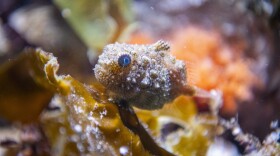In Greek mythology, the original god of the sea was named Nereus. Among other powers, he could prophesy the future. That’s why researchers at the University of British Columbia thought to name a project to predict future ocean conditions after Nereus. Now, the initial computer simulations are out.
The Nereus Program is designed to answer the question, will there be seafood and a healthy ocean years from now… up to the end of this century. Univ. of B.C. fisheries experts are coordinating an international group of researchers to perfect a sophisticated oceanic simulator.
It incorporates existing climate change models and then accounts for fishing pressure, ocean acidification and decreasing dissolved oxygen. The programmers are trying out 3D gaming technology to make this all more understandable. In Vancouver, Professor Villy Christensen says the initial computer runs show a disturbing trend.
“It’s goodbye big fish. Then it’s hello to small fish. We are seeing many more of the small fish, the fish that we are not interested in, at least not with current technologies,” says Christensen.
Christensen and his colleagues say the most obvious way to reverse the trend would be to curb overfishing and greenhouse gas pollution that eventually drives ocean food web changes.








